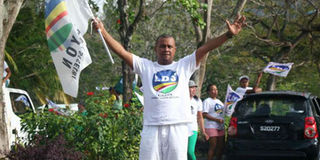Seychelles and Cape Verde show how elections should be conducted

A supporter of the opposition coalition of the Seychellois Democratic Alliance holds up a flag as he celebrates the victory of the party in the parliamentary elections in Victoria, Seychelles on September 11, 2016. PHOTO | RASSIN VANNIER | AFP
What you need to know:
Free and fair elections in some countries have shown that African votes do not necessarily have to be messy, violent and fraudulent.
Particularly commendable are political developments in some of the continent’s island nations.
Although relatively small in size and population, these countries are among few examples of workable democracy on the continent.
With the last quarter of 2016 just around the corner, impressive electoral events have unfurled in Africa though they were not highlighted in the media.
Free and fair polls in some countries have shown that African elections do not necessarily have to be messy, violent and fraudulent.
Particularly commendable are the political developments in some of the continent’s island nations.
Although relatively small in size and population, these countries are among the few examples of workable democracy on the continent.
A case in point is the Seychelles, where the electoral commission last Sunday announced the final results of the parliamentary polls held from September 8 to 10.
The election, whose results were described by analysts and citizens as historic, saw three parties and three independent candidates running for the 25 directly-elected seats.
Apart from these positions, the country’s constitution provides for up to 10 other seats allocated to parties on the basis of their performance in the polls.
Remarkably, when the chips were down, the opposition Linyon Demokratik Seselwa (LDS) alliance, had won 19 of the 33 seats up for grabs.
The ruling Parti Lepep (People’s Party) won 14 seats.
Incidentally, only 17 seats were needed for a parliamentary majority.
Equally remarkable was the fact that out of 71,932 eligible voters, 62,939 took part in the poll, signifying an unusually high voter turnout of 87 per cent.
A total of 1,547 votes were rejected.
EASILY TROUNCED
The upshot was that the Opposition had easily trounced the ruling Parti Lepep for the first time since the return of multiparty democracy in 1993.
Since that year, the ruling party has had the majority in parliament.
It evidently took great effort for the LDS – a coalition of four parties – to change the entrenched equation.
The coalition includes the Seychelles National Party (SNP), which incidentally boycotted the last parliamentary elections in 2011.
Poignantly, the recent poll in Seychelles was reminiscent of what took place last March in Cape Verde.
In that minute island nation on the other side of the continent, the main opposition Movement for Democracy (MPD) party confounded many when it won an absolute majority in parliamentary elections.
The MPD ousted the ruling African Party for the Independence of Cape Verde (PAICV).
Even before all the votes were counted, MPD had won 53.7 per cent of the ballots cast against 37 per cent for the PAICV.
Unlike in the Seychelles though, the parliamentary polls in Cape Verde came months before the country’s presidential election, which is slated for October 2.
Campaigning began last week and is expected to close on September 30.
Reports from Cape Verde indicate that the presidential candidates will be three.
Among those battling it out for the island nation’s top seat will be the incumbent president Jorge Carlos Fonseca, who won the last election held on August 21, 2011.
TWO OTHERS
This time, he will battle it out with two others: Albertino Graça, who is the dean of the country’s Mindelo University, and war veteran Joaquim Monteiro, who will be running as an independent candidate.
In contrast to the perennial electoral mess in many other African countries, the Seychelles and Cape Verde parliamentary polls were transparent, orderly and peaceful.
Gabon is still reeling from the chaos of a controversial poll that saw incumbent Ali Bongo declared winner.
Moreover, it is impressive that Cape Verde, which has a population of about half a million, has one of Africa’s lowest poverty rates.
As for the latest poll in Seychelles, it is intriguing that the opposition coalition won after the country’s president James Michel – who is also the leader of Parti Lepep – was declared the winner of the December 2015 presidential vote.
He narrowly won the poll with 50.15 per cent of the votes against SNP leader Wavel Ramkalawan who garnered 49.85 per cent of the ballots.
Interestingly, the opposition challenger was so formidable during the presidential vote that only 193 votes separated the two.
Remarkably, during the previous parliamentary poll, Michel and his PP won 31 seats, translating to 88.56 per cent of parliamentary majority.
Clearly, the Seychelles opposition has come a long way since then and now has firm control of the legislature, even as President Michel remains the head of the executive arm.
African countries notorious for perennially bungled polls have a lot to learn from Cape Verde and Seychelles.




